We recently analyzed 240K WordPress LMS websites to determine what technology they use.
We looked at the LMS plugins, page builders, website themes, eCommerce solutions, and even their tech spending.
With the help of our data partner BuiltWith, we uncovered some interesting findings, which we’ll share with you in this article.
One of the most important questions a course creator has to answer is what LMS plugin to use.
Based on our analysis, 83,415 course websites use LearnDash as their WordPress LMS plugin, making it the market leader with a share of 34.8%.
The next most popular LMS plugin options are LearnPress, used by 74,379 websites (31%), and Tutor LMS, used by 45,623 websites (19%).
The remaining websites use MasterStudy LMS (4.9%), Lifter LMS (4.2%), Sensei LMS (3.7%), WP Courseware (1.9%), and AccessAlly (0.4%).
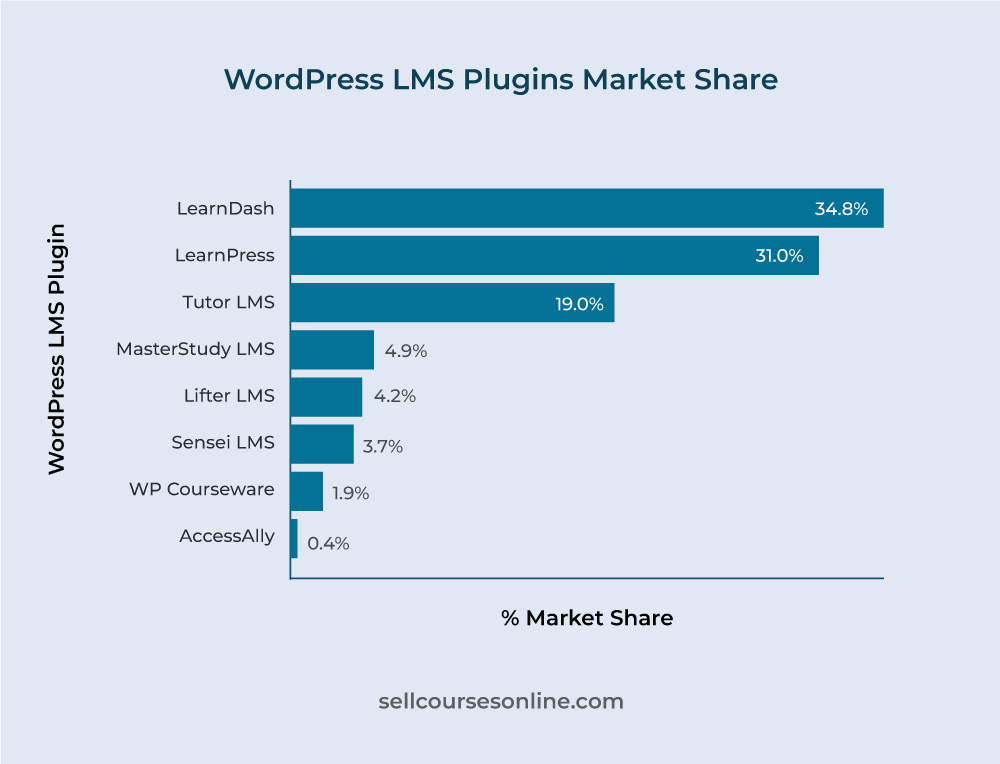
To better understand these usage patterns, we looked further into the websites with a high technology spend (>$250/month) and those with a low spend (<$50/month).
Among the websites with a high tech spend, LearnDash controls an even bigger market share of 60.3%.
This isn’t surprising, as LearnDash is used by the biggest names in the industry, including Yoast, the University of Florida, and DigitalMarketer.
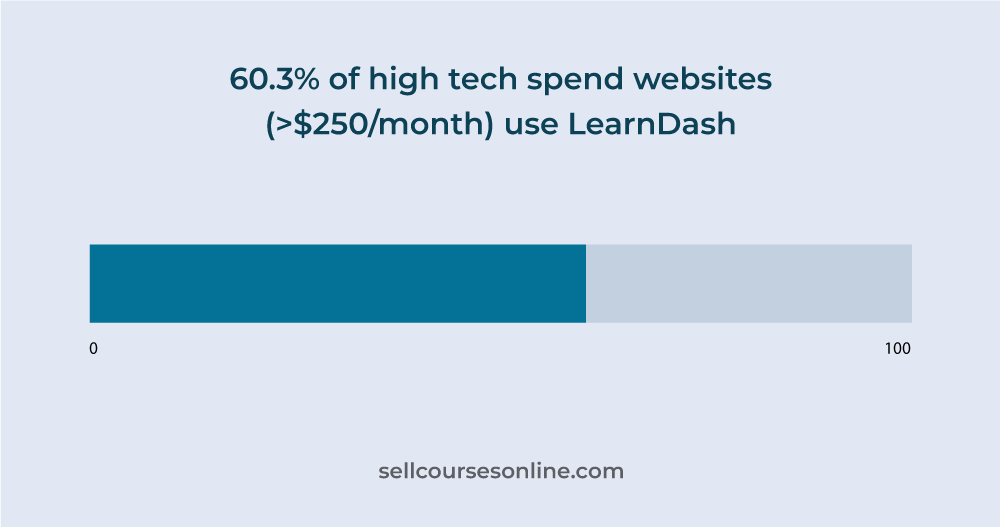
For the low-tech spend category, instead, we found that 97.8% of websites use an LMS plugin that offers a free version. The leaders in this category are LearnPress (50%) and Tutor LMS (28.8%).
On the other hand, plugins like LearnDash, WP Courseware, and AccessAlly—which don’t offer a free version—have a market share of slightly more than 2%.
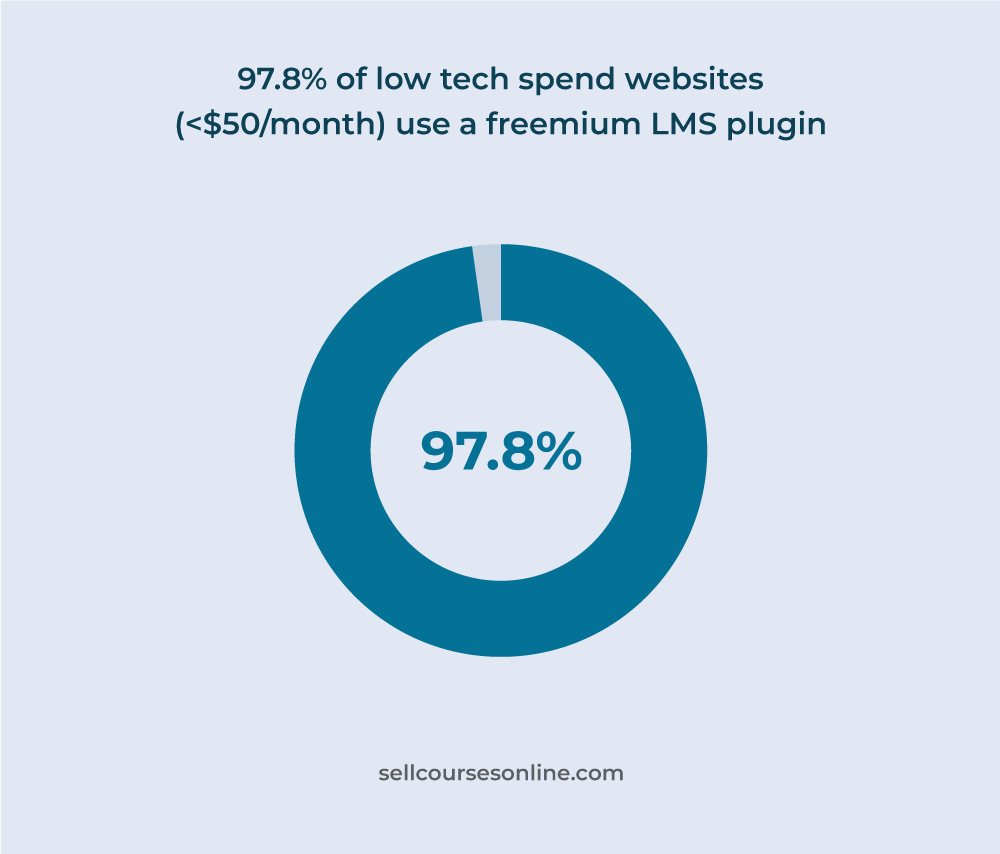
Another common question that webmasters have is how much course websites spend on their technology stack.
To answer this, we looked at the monthly tech spend of individual websites and found that 41.3% spend less than $50, 34.9% spend between $50 and $250, and only 23.8% spend more than $250 per month.
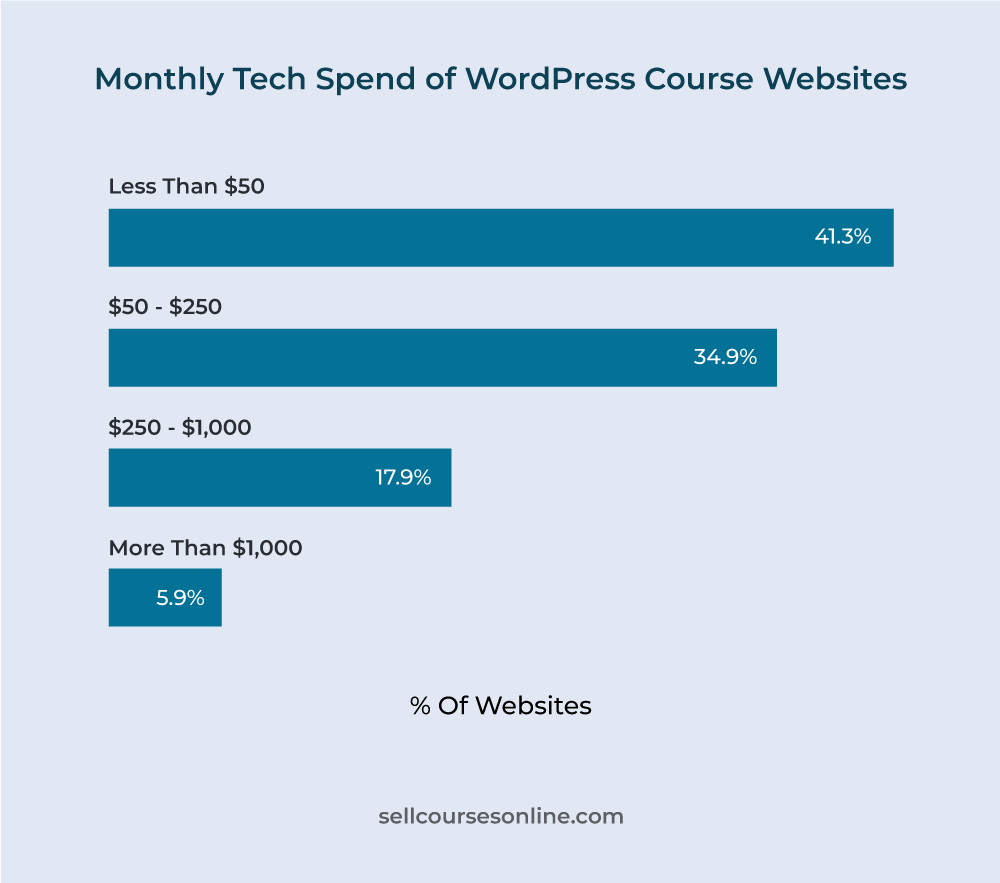
We also tried to see if there was a correlation between a website’s monthly tech spend and its monthly revenue, and there seems to be a reasonably strong correlation.
Specifically, among the websites with monthly revenue of less than $1k, only 11.9% of them have a monthly tech spend of more than $50. However, for websites making $1k-$5k per month, the number increases to 60% and hits 89.7% for websites making more than $5k a month.
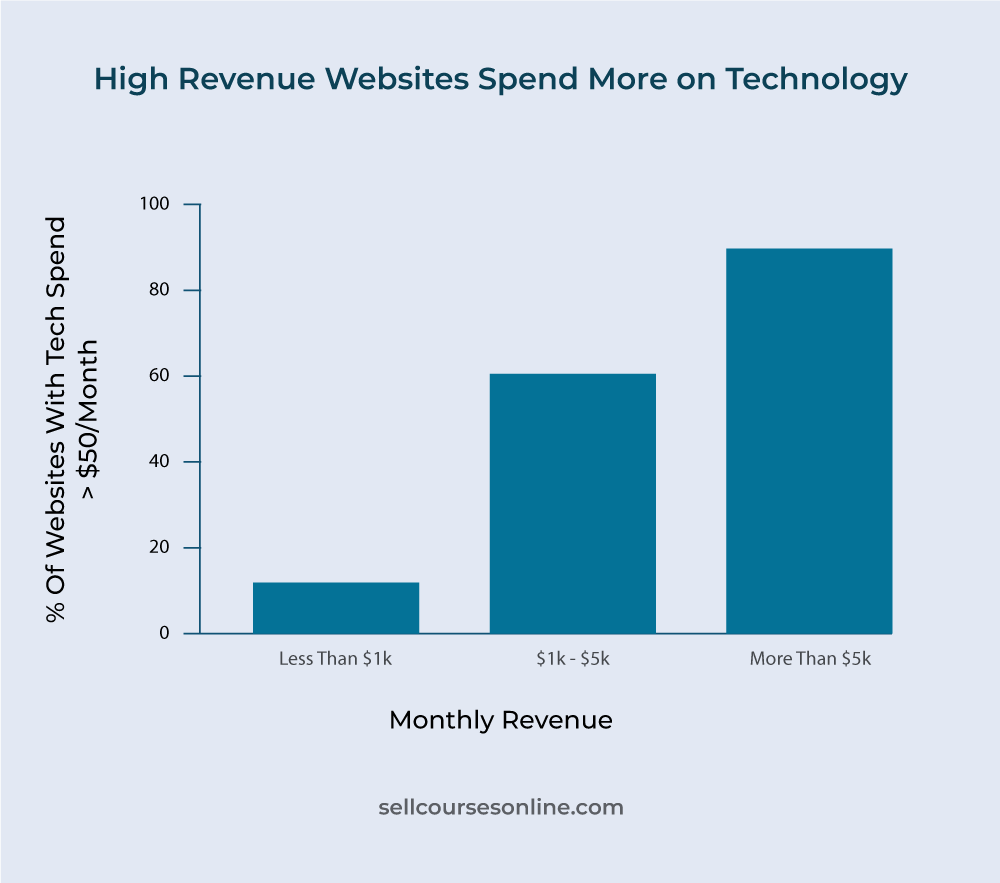
Another point of interest for our study was to see what eCommerce plugins were used by these WordPress sites. Undoubtedly, WooCommerce emerged as the unchallenged winner.
Of all the websites that use LMS plugins, 65.3%—or 156,562 of them—use WooCommerce as their shopping cart solution.
While some websites also use other cart solutions, such as Easy Digital Downloads and SamCart, their share is pretty low.
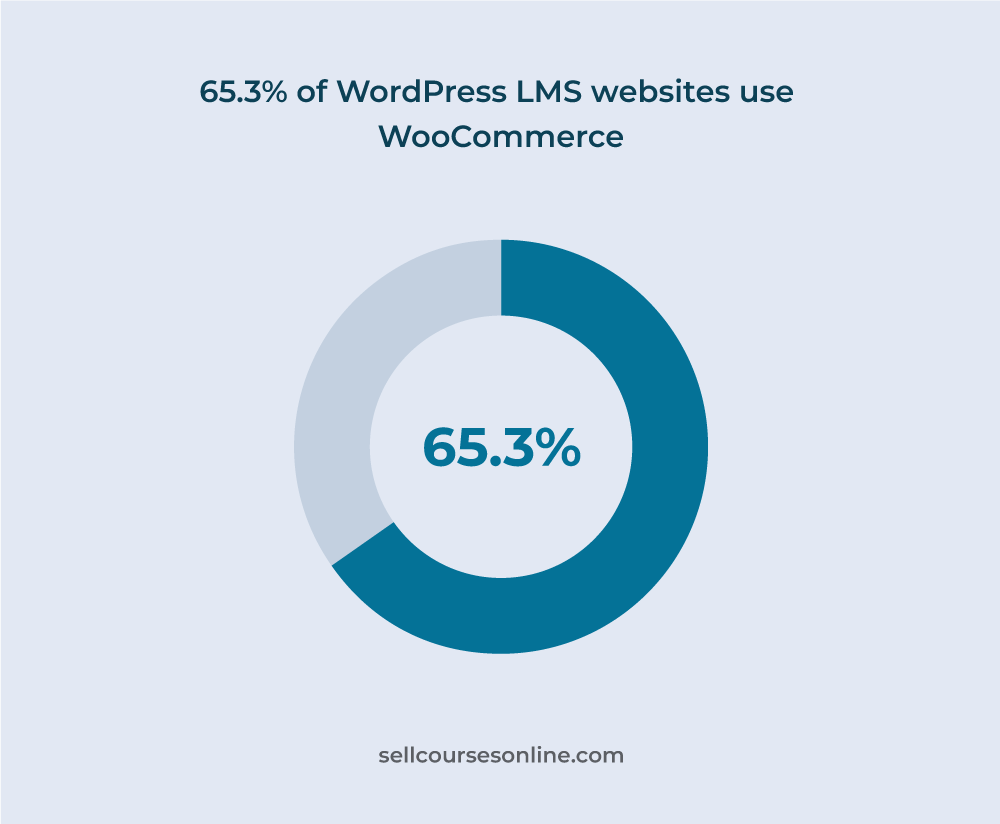
Moreover, WooCommerce’s usage varies based on what LMS plugin the website uses. For example, 77.5% of Tutor LMS websites use WooCommerce, while only 20.7% of AccessAlly websites use the plugin.
This variance can be explained by the fact that AccessAlly has solid built-in checkout features and payment gateway integrations, while Tutor LMS doesn’t.
When looking at the tech profile of these WordPress LMS websites, page builders were another point of interest.
In our analysis, Elementor emerged as the first choice of course creators since 137,859 (57.5%) websites use it. Other popular page builders include WPBakery (17.6%) and Visual Composer (17.2%).
Just these three page builders are used by 90% of the websites, but it’s hardly surprising. After all, this is the era of page builders!
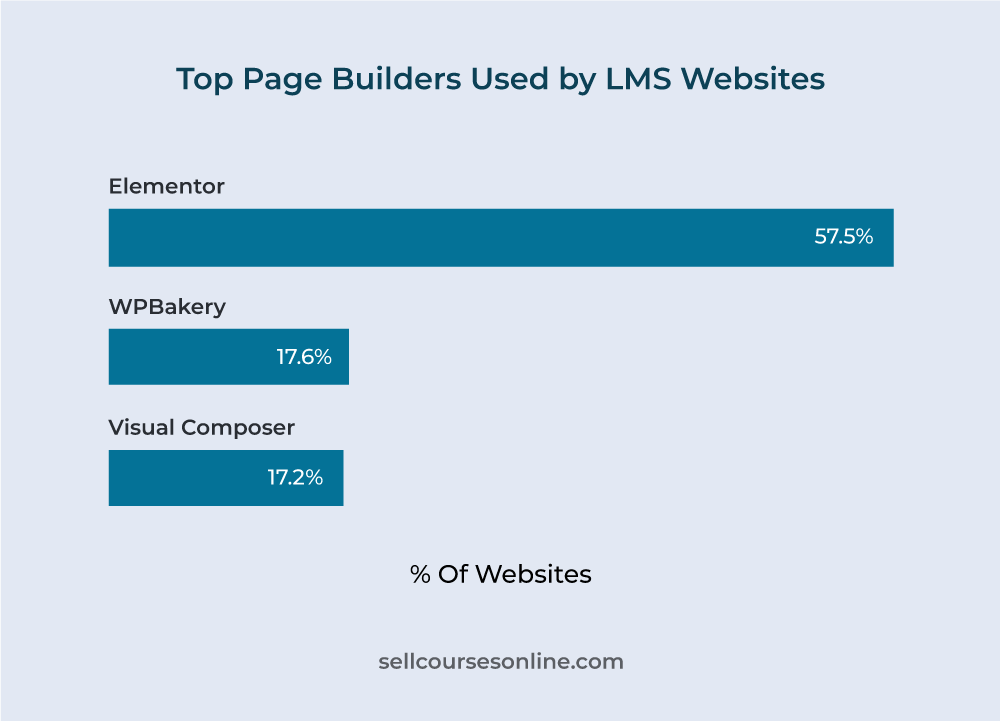
Another critical aspect of any WordPress website is the site theme.
In this regard, Astra is the clear winner, with a 19% market share. It is also the leading LearnDash theme, with a market share of 29.7%.
Divi and Hello Elementor, instead, are used by 9.1% and 5.9% of the LMS websites, respectively.
While Astra and Divi are among the most popular themes out there, Hello Elementor piggybacked on the popularity of Elementor, gaining a significant market share.
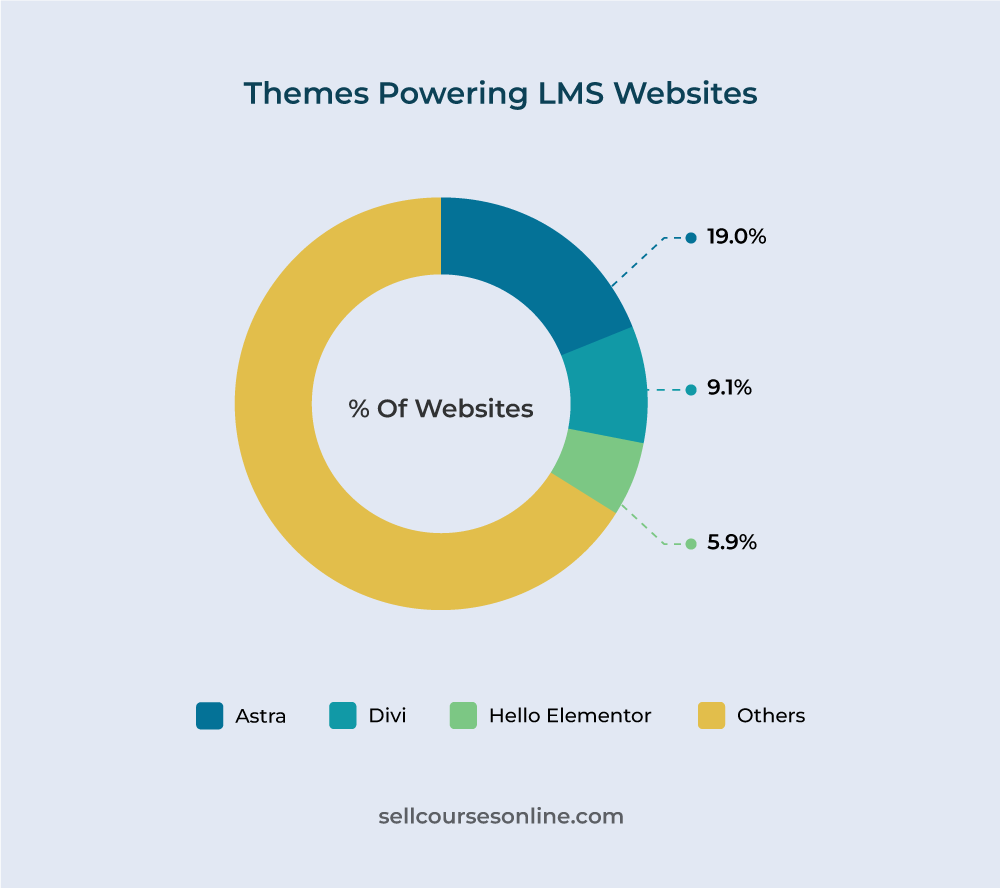
Overall, the market of WordPress themes is fragmented—much more than LMS plugins or page builders. This is because, comparatively, there are many more options for themes.
Other popular theme options—including Kadence, GeneratePress, Thrive Themes, and more—all have single-digit market shares.
Another interesting thing we noticed is that specialized themes command a much higher market share for individual LMS plugins. Here are some examples:
However, in the case of MasterStudy, the number is exceptionally high because the theme is bundled with the LMS plugin.
Subscription-based memberships are a popular product type used by many course creators. In fact, a membership plugin allows you to charge and manage subscriptions and restrict access to your content.
Of all the membership plugins, Paid Memberships Pro is the most popular and is used by 13.5% of course websites.
The second most widely used option is Ultimate Member (5%), followed by WooCommerce Memberships (2.2%) and MemberPress (1.9%).
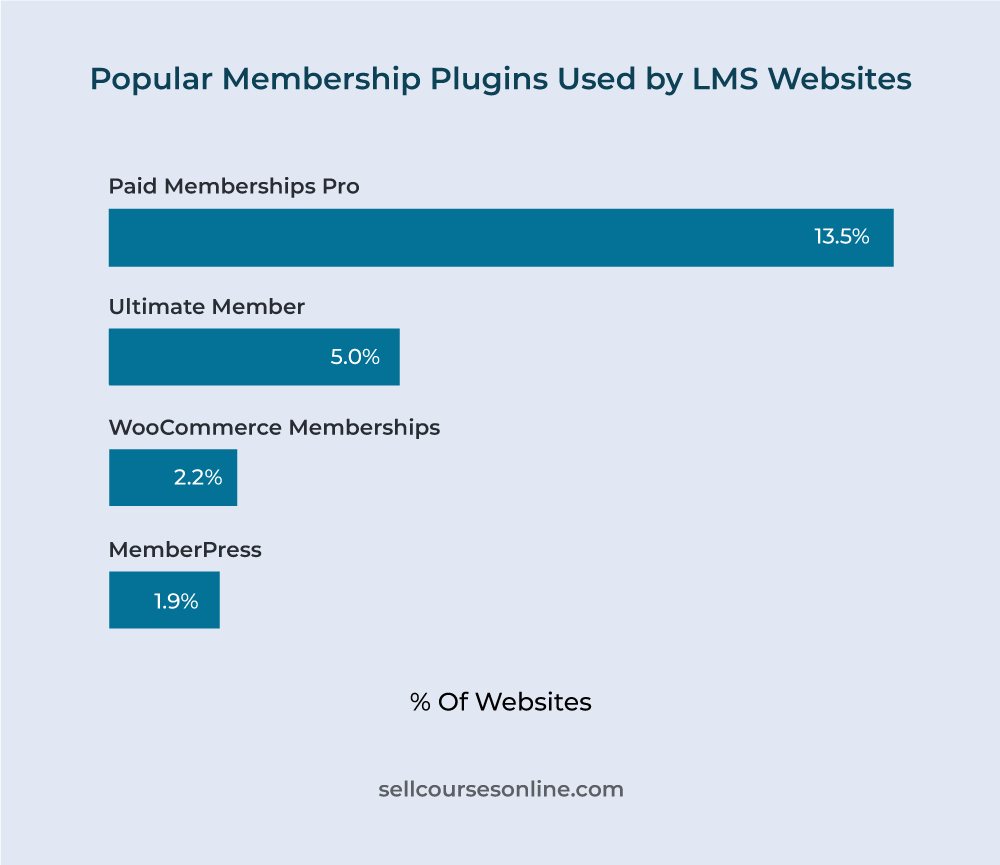
Apart from the general solutions that all LMS plugins can use, there’s also a big market for specialized plugins.
These types of add-ons are designed to be used with specific LMS plugins and bring additional functionalities to the websites that use them.
Some standout plugins in this category include:
While the first option is used by 26.5% of the Tutor LMS websites, the second and third options are LearnDash-specific and used by 26% and 10% of the websites.
The best LMS plugins have a bigger ecosystem of specialized add-ons and plugins supported by third-party developers. One such developer is WisdmLabs, which offers several LearnDash-specific products.
We also looked at the usage of some other popular plugins that don’t necessarily fall into any of the above categories but are still important to consider.
Some standout solutions from the websites in our study and their usage % are:
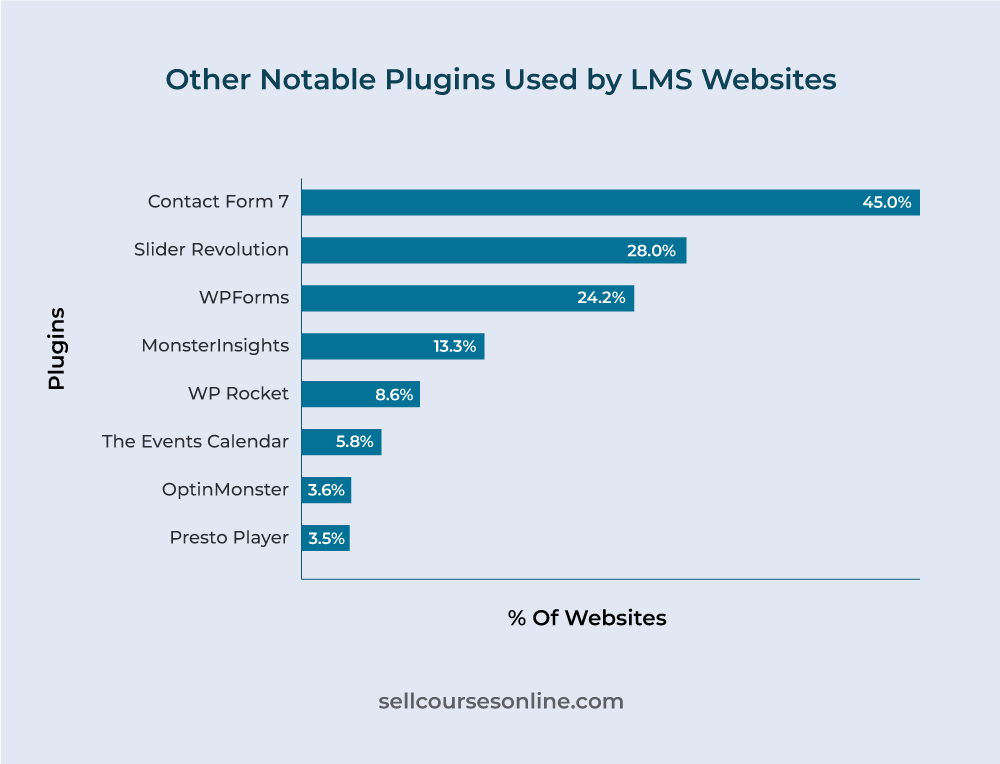
We hope this study helped you gain valuable insights into the tech stack of WordPress course websites.
We discussed various plugins and solutions, including WordPress LMSs, page builders, website themes, eCommerce plugins, and more.
We’d also like to thank BuiltWith for providing all the data that made this study possible.
Now we’d like to hear from you. Do you have any questions about our study findings or methodology?
Leave them below, and we’ll get back to you as soon as possible.
To conduct this study, we considered the eight most popular WordPress LMS plugins and included only the websites using one of them. The plugins include:
✅ LearnDash
✅ LearnPress
✅ Tutor LMS
✅ MasterStudy LMS
✅ Lifter LMS
✅ Sensei LMS
✅ WP Courseware
✅ AccessAlly
We accessed the list of all the course websites using these plugins with the help of BuiltWith, which included around 240K websites. The data was pulled in early October 2022.
We then looked at the tech profile of each website to see what solutions they use and analyzed the data to gather insights about the most popular choices among course creators.

Hey there! I'm Baidhurya, the brains behind SellCoursesOnline. I used to run a digital agency, where I helped course businesses launch their eLearning platforms. I also led the tech and marketing teams at StationX, helping it grow to 500K+ students. In addition, I created the popular supply chain network design course. With 8+ years of experience, I'm here to share my expertise and insights on course creation and platforms with you.
SellCoursesOnline is supported by its audience. When you purchase through links on our site, we may earn affiliate commissions. However, this doesn’t influence our reviews or product listings. All opinions are based on our tests and personal experience with a product/service.
Copyright © 2024 by SellCoursesOnline

Hey there! I’m Baidhurya, the brains behind SellCoursesOnline. I used to run a digital agency, where I helped course businesses launch their eLearning platforms. I also led the tech and marketing teams at StationX, helping it grow to 500K+ students. In addition, I created the popular supply chain network design course. With 8+ years of experience, I’m here to share my expertise and insights on course creation and platforms with you.

We respect your privacy and will never spam you.